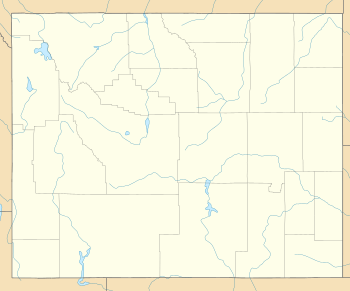Tensleep Sandstone
The Tensleep Sandstone is a geological formation of Pennsylvanian to very early Permian age in Wyoming.[2]
| Tensleep Formation Stratigraphic range: Late Pennsylvanian to very Early Permian | |
|---|---|
| Type | Geological formation |
| Underlies | Phosphoria Formation or Chugwater Formation |
| Overlies | Sacajewea Formation or Amsden Formation |
| Thickness | up to 535 feet (160 m) |
| Lithology | |
| Primary | Sandstone |
| Other | Limestone |
| Location | |
| Coordinates | 42.6°N 108.2°W |
| Approximate paleocoordinates | 4.3°N 35.2°W |
| Region | |
| Country | |
| Type section | |
| Named for | Ten Sleep, Wyoming |
| Named by | N.H. Darton[1] |
| Year defined | 1904 |
 Tensleep Sandstone (the United States)  Tensleep Sandstone (Wyoming) | |
Trace fossils
In 1932 Edward Branson and Maurice Mehl reported the discovery of a fossil trackway in the formation.[3] A new ichnospecies, Steganoposaurus belli, was erected for these footprints.[3] The tracks were probably made by a web-footed animal slightly less than three feet long.[3] This creature was originally presumed to be an amphibian, but the toe prints it left behind were pointed like a reptile's rather than round like an amphibians. The actual trackmaker may have been similar to the genus Hylonomus.[4] The ichnogenus Tridentichnus are similar footprints preserved in the Supai Formation of Arizona.[5]
References
- Darton, N.H., 1904, Comparison of the stratigraphy of the Black Hills, Bighorn Mountains, and Rocky Mountain Front Range: Geological Society of America Bulletin, v. 15, p. 379-448.
- U.S. Geological Survey. "Geologic Unit: Tensleep". Retrieved 2014-12-23.
- "Western Traces in the 'Age of Amphibians'," Lockley and Hunt (1995); page 34.
- "Western Traces in the 'Age of Amphibians'," Lockley and Hunt (1995); page 35.
- "Western Traces in the 'Age of Amphibians'," Lockley and Hunt (1995); pages 34-35.
Bibliography
- Lockley, Martin and Hunt, Adrian. Dinosaur Tracks of Western North America. Columbia University Press. 1999.
This article is issued from Wikipedia. The text is licensed under Creative Commons - Attribution - Sharealike. Additional terms may apply for the media files.
